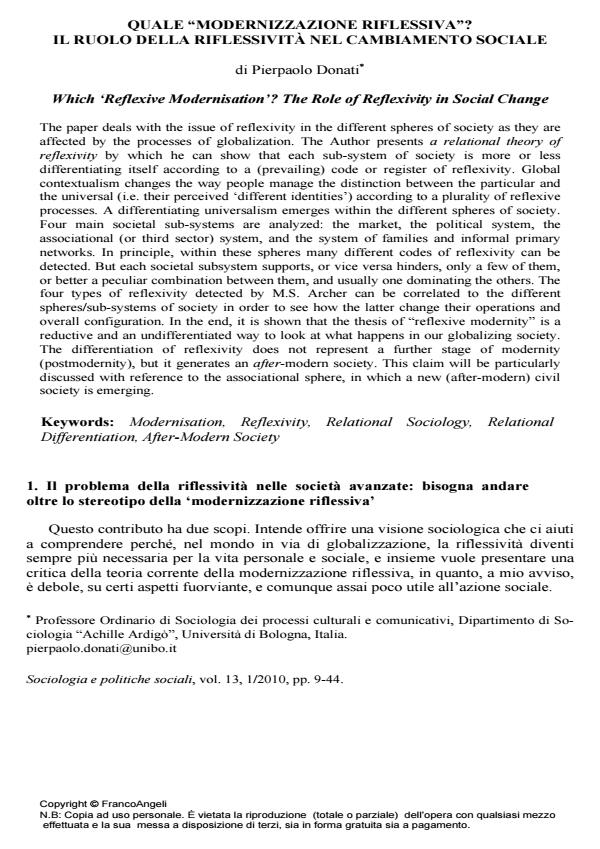Quale "modernizzazione riflessiva"? Il ruolo della riflessività nel cambiamento sociale
Titolo Rivista SOCIOLOGIA E POLITICHE SOCIALI
Autori/Curatori Pierpaolo Donati
Anno di pubblicazione 2010 Fascicolo 2010/1
Lingua Italiano Numero pagine 36 P. 9-44 Dimensione file 690 KB
DOI 10.3280/SP2010-001002
Il DOI è il codice a barre della proprietà intellettuale: per saperne di più
clicca qui
Qui sotto puoi vedere in anteprima la prima pagina di questo articolo.
Se questo articolo ti interessa, lo puoi acquistare (e scaricare in formato pdf) seguendo le facili indicazioni per acquistare il download credit. Acquista Download Credits per scaricare questo Articolo in formato PDF

FrancoAngeli è membro della Publishers International Linking Association, Inc (PILA), associazione indipendente e non profit per facilitare (attraverso i servizi tecnologici implementati da CrossRef.org) l’accesso degli studiosi ai contenuti digitali nelle pubblicazioni professionali e scientifiche.
The paper deals with the issue of reflexivity in the different spheres of society as they are affected by the processes of globalization. The Author presents a relational theory of reflexivity by which he can show that each sub-system of society is more or less differentiating itself according to a (prevailing) code or register of reflexivity. Global contextualism changes the way people manage the distinction between the particular and the universal (i.e. their perceived ‘different identities’) according to a plurality of reflexive processes. A differentiating universalism emerges within the different spheres of society. Four main societal sub-systems are analyzed: the market, the political system, the associational (or third sector) system, and the system of families and informal primary networks. In principle, within these spheres many different codes of reflexivity can be detected. But each societal subsystem supports, or vice versa hinders, only a few of them, or better a peculiar combination between them, and usually one dominating the others. The four types of reflexivity detected by M.S. Archer can be correlated to the different spheres/sub-systems of society in order to see how the latter change their operations and overall configuration. In the end, it is shown that the thesis of "reflexive modernity" is a reductive and an undifferentiated way to look at what happens in our globalizing society. The differentiation of reflexivity does not represent a further stage of modernity (postmodernity), but it generates an after-modern society. This claim will be particularly discussed with reference to the associational sphere, in which a new (after-modern) civil society is emerging.
Parole chiave:Modernisation, Reflexivity, Relational Sociology, Relational Differentiation, After-Modern Society
- ‘All together now!’Couples and the ontological problem of cohabitation as a form of life Luca Martignani, in International Review of Sociology /2011 pp.565
DOI: 10.1080/03906701.2011.625665 - Double reflexivity and social change: towards a critical understanding of reflexive actions and discourses in sport for development and peace Dino Numerato, Eva Soares Moura, in Qualitative Research in Sport, Exercise and Health /2025 pp.1
DOI: 10.1080/2159676X.2025.2556281
Pierpaolo Donati, Quale "modernizzazione riflessiva"? Il ruolo della riflessività nel cambiamento sociale in "SOCIOLOGIA E POLITICHE SOCIALI" 1/2010, pp 9-44, DOI: 10.3280/SP2010-001002